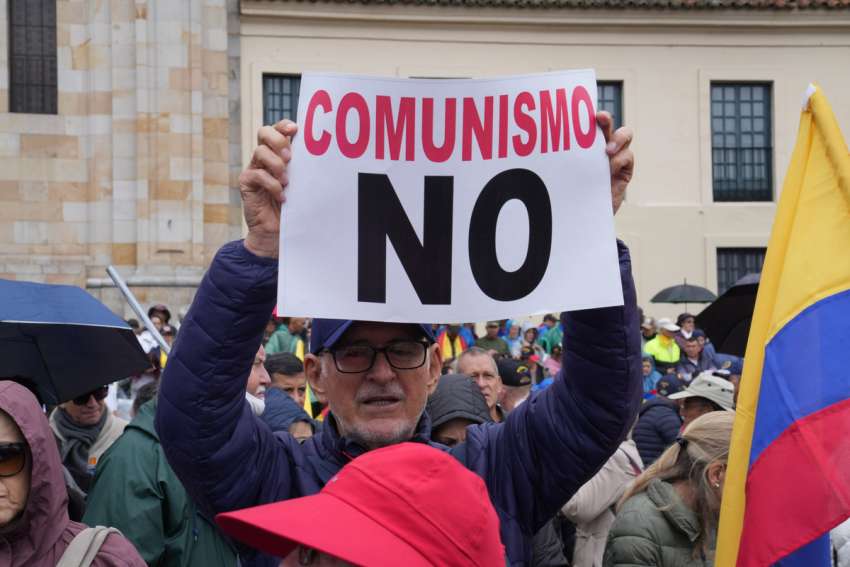BOGOTÁ, Colombia -- The Colombian bishops' conference has welcomed the beginning of a six-month ceasefire between the nation's military and the largest remaining rebel group in the country, and began to train dozens of priests and lay workers from different parts of the country on how to help monitor the truce.
In a statement published on Aug. 10, the bishop's conference said that 31 representatives from 18 different dioceses were briefed on the details of the ceasefire and on international humanitarian law. The group also discussed methods that would be most suitable to report breaches of the ceasefire.
"We will take this knowledge to our territories," said Father Jairo Alberto Rave, from the Diocese of Barrancabermeja, "so that we can make an important contribution" to the peace process.
The truce started on Aug. 3, and seeks to facilitate peace talks between the Colombian government and the National Liberation Army (known by its Spanish acronym, ELN,) a Marxist-oriented rebel group with approximately 2,000 to 5,000 fighters that is particularly influential in the west of Colombia and along its eastern border with Venezuela.
It is the longest ceasefire ever between Colombia's government and the ELN and is part of President Gustavo Petro's plans to pacify rural areas of the country that are still affected by violence waged by rebel groups and drug cartels that were not part of a 2016 peace deal between the Colombian government and the FARC guerrilla group.
The Catholic Church has been present at the peace talks through Bishop Héctor Fabio Henao, who heads the Colombian bishops' conference's delegation for relations between church and state.
In an interview with public radio station Señal Colombia last week, Bishop Henao said that the church's mission will be to accompany communities that have been affected by the war. The church also wants to ensure that their complaints and concerns reach a verification team that is made up of delegates from the ELN, the military and the United Nations, and will be in charge of recording ceasefire breaches and taking them to the negotiators.
"We will act as a bridge, so that information can flow correctly," Bishop Henao said.
Under the ceasefire, the ELN rebels and the military have promised to stop attacking each other. But they have also said they will comply with international humanitarian law, which means they must stop attacks on civilians.
The ELN has been known to kidnap civilians for ransom, and also issued death threats against human rights leaders and local politicians who have criticized the group for recruiting minors, taxing local businesses, blowing up oil pipelines and taking a cut from the cocaine trade.
In Arauca, an oil producing province along Colombia's border with Venezuela, human rights leaders told OSV News that they felt optimistic about the truce, and hoped that it would lead to a peace accord that will benefit the region.
"These talks shouldn't just determine what happens to those who have taken up arms," said Older Cáceres, a former member of Arauca's legislature who now works for a humanitarian group called the Alliance for Peace and Development. "The talks should generate sustainable development opportunities for the entire population."
The ELN has been vague so far about what it seeks to get in exchange for laying down its weapons. But the group has hinted that it wants to see changes in Colombia's electoral system and will also push for the nationalization of Colombia’s oil fields.
During a recent event that was staged to mark the start of the ceasefire, the rebels lead negotiator Pablo Beltrán said that he wanted the government to prioritize spending on social programs, over paying back debts to foreign creditors.
Although the ceasefire has been welcomed by human rights activists and Catholic Church leaders, it has also been rejected by some segments of Colombian society.
In July, thousands of people showed up at a rally in Bogotá to protest against President Petro's security policies, including the ceasefire.
The group included many retired police and military officers, with some of them pointing out that other rebel groups have used ceasefires in the past to save money, buy more weapons and go back to war, once they were not satisfied with what was offered to them at peace talks.
"You have to be tougher with terrorists," said Cristian Arias, a retired police officer. "(President) Petro is giving them too many advantages."
As the ceasefire begins, some parts of the country continue to struggle with violence.
At the beginning of August more than 1,000 people had to flee their villages in the municipality of Samaniego, to escape fighting between the ELN, and a FARC holdout group that did not join the 2016 peace deal. The current ceasefire does not prevent the ELN from fighting against other rebel groups.
The bishops of Nariño province, where Samaniego is located, reacted to the incident.
"We reject the blood that so many people have been forced to shed in this region, over the past few weeks," the bishops said in a statement published on Aug. 7. "We reject all of the abuses that affect civilians every day, in these areas where armed groups are present."
More than 450,000 people have been killed in nearly 60 years of armed conflict in Colombia.


